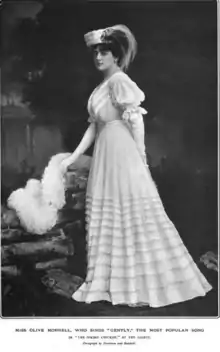Olive Morrell
Olive Morrell, born Olive Miller, was an English actress, especially in Edwardian musical comedies.


Early life
Morrell grew up in Highgate, near London. A singing teacher introduced her to theatrical producer George Edwardes, which led to roles at the Gaiety Theatre, London.[1]
Career
Morrell originated roles in the Edwardian musical comedies A Greek Slave (1898–1899),[2] San Toy (1900),[3] A Country Girl (1902–1904), The Catch of the Season (1904–1906), Sergeant Brue (1904), Under a Panama (1904),[4] The Talk of the Town (1905), and The Spring Chicken (1905).[5] She appeared in a benefit performance of Gilbert and Sullivan's Trial by Jury in 1906.[6][7] As a Gaiety Girl, Morrell's appearance and gowns were at least as reviewed as her talents, and she was a popular subject for photo postcards.[8]
In 1904, Morrell defended actresses from criticism by writer Marie Corelli. "Actresses are not more extravagant than other people," Morrell responded.[9]
She toured as a performer in musicals and pantomime Australia for six months in the 1906–1907 season.[1][10] The press's interest in her appearance continued: "She is distinctly English, with her lovely complexion of milk and roses, a skin as fine as a baby's, straight delicate features, and good grey eyes," wrote one interviewer in a Melbourne newspaper, continuing to describe her teeth ("perfect"), her smile ("bewitching"), her eyebrows, her hair, her height, and her dress.[11]
"If any girl has any ability for the stage, I never blame her for going on," Morrell said in 1906. "It is really the best thing a woman can do, and now there is a very much better class upon the stage. Managers have realized, I think, that a girl who is decently educated and nicely brought up is quicker to understand and learn, and also that she generally makes a better impression than the comparatively uneducated girl."[11]
Personal life
Morrell married Australian politician Willie Kelly in 1908, in London.[12][13] When they separated, Morrell moved back to England with their daughter.[14]
References
- "Confidences of Stage Favorites: Miss Olive Morell", The Sunday Times, December 9, 1906, p. 5, via Trove
- Wearing, J. P. The London Stage 1890–1899: A Calendar of Productions, Performers, and Personnel, Scarecrow Press (2013), p. 382. ISBN 9780810892828
- "Grand Theatre" The Age, April 21, 1900, p. 8, via Newspapers.com

- "'Sergeant Brue' at the Prince of Wales", Sketch, August 31, 1904, p. 260
- Caryll, Ivan and Lionel Monckton, The Spring Chicken, Chappell & Company (1905), unnumbered cast page.
- "Trial by Jury at the Terry Matinee", The Bystander, June 20, 1906, p. 603
- Edwards, G. Spencer. "Concerning Olive Morrell", The Illustrated Sporting and Dramatic News, August 5, 1905, p. 894
- "Miss Olive Morrell", Punch, November 8, 1906, p. 8, via Trove
- "Corelli Attacks the Women", Buffalo Times, August 28, 1904, p. 14, via Newspapers.com
- "Miss Olive Morrell", The Sunday Sun, October 7, 1906, p. 1, via Trove
- "The Interviewer: Miss Olive Morrell", Table Talk, November 1, 1906, p. 12, via Trove
- Kelly, Frederick Septimus. Race Against Time: The Diaries of F.S. Kelly, National Library Australia (2004), p. 395. ISBN 9780642107404
- "Mr. William Kelly M. P., Marriage to Miss Morrell", The Telegraph, February 20, 1908, p. 4, via Trove
- Rutledge, Martha. "William Henry Kelly", Australian Dictionary of Biography (1983).
External links
- The National Portrait Gallery (UK) has six postcard images of Olive Morrell, by various photographic studios.
- The U. S. National Library of Medicine has a photograph of Olive Morrell in a nurse's uniform, from about 1908, in their digital collections.